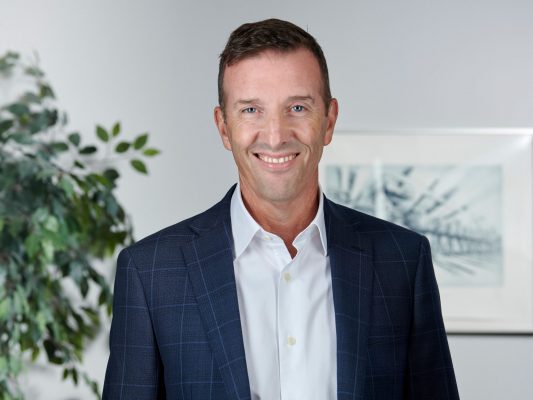For each issue since its inception more than two years ago, FlexPack VOICE® has hosted a question-and-answer segment with an industry leader. In this issue, we interview Andrew Wheeler, president of Windmoeller & Hoelscher Corporation (W&H), and a board member of the Flexible Packaging Association (FPA) for approximately 10 years.
Wheeler was raised in Cleveland, Ohio, and graduated from the University of Vermont in 1986. He has been with W&H for 34 years, having gotten the job through a connection he made after working in a sales position in Germany. W&H is a major supplier of machinery for the flexible packaging industry worldwide.
His interests outside of work led him among other things to produce an original play that was written by a friend and shown at a festival in Edinburgh, Scotland. “It was well received, and it had a little bit of traction for a while,” he says.
FlexPack VOICE®: What do you see as the major issues facing the industry this year, globally and/or domestically?
Andrew Wheeler: The global supply chain crisis is wreaking havoc on all industries, and then there is the quest for sustainability and a reduction of plastics on the planet.
FPV: Sustainability often comes up when answering the first question, so what is the industry doing well and where does it need to get better in this area?
AW: I think the industry has been working in the right direction, and sustainability remains the primary topic discussed, although there was certainly a pause in the urgency during the first year and a half of the COVID pandemic. We see that individual companies are working hard for their products and services to be as sustainable as possible. For many years, the primary goal was “thinner, better, faster, stronger” to reduce the volume of packaging waste to the lowest level. All of this is going on, but with a great deal of finger-pointing as to who is responsible for what.
COVID made quite clear that effective packaging is critical to the safety of packaged goods, and, therefore, added a good amount of plastic packaging to the market. It contributed to the “plastics problem,” but at the same time, I feel the industry missed the opportunity to highlight the benefits of plastics and their crucial role in hygiene/sterility and keeping people shielded from the virus. The entire world was experiencing this at the same time. Surely this should have been an “aha” moment for many. That would not have eliminated the problem of plastic pollution, but it would have helped change the perception of plastics so that discussions going forward could be more rational and less emotional. For instance, the “single-use” plastic regulations do not make much sense—the goal is fewer plastics, but plastic shopping bags now must be thicker to be considered reusable and not “single-use.” That translates into more waste under the guise of being sustainable.
“I have always felt that most people want and try to be environmentally friendly—but as long as it is also convenient for them.”
A general problem in this landscape is us— meaning “we” as consumers and citizens. I have always felt that most people want and try to be environmentally friendly—but as long as it is also convenient for them. For example, look at recycling bins. Many states have one bin for plastic, paper, glass, cans, etc. and that is adding to the municipal sorting challenge. How much of that is truly being recycled and reused? It will be up to the industry to guide consumers into accepting less perfectly clear plastics as recycled materials are added. The different appearance, if noticed, will need to be sold as “cool.” That is, some brands are adding verbiage to packaging that explains that color variations in packaging are because they contain recycled content. The fact is we all need to be on board.
FPV: What about sustainability efforts at your company?
AW: At W&H, as the technological leader and a global concern, we have a philosophy that we call “Greenovation” for years. It articulates our commitment to developing machinery that uses as little energy as possible and allows our customers to process challenging but environmentally friendly materials, PCR for example. End users are requiring higher and higher percentages of recylates in their packaging, and we are making sure that can happen. We work with both customers and resin companies to develop and test recipes and come up with machinery changes to process them.
W&H’s goal is always that customers can run their machinery as streamlined as possible, with as little energy, material, and waste as possible. Automation modules and information systems are playing a crucial role in making this happen.
FPV: What would you like to see done when it comes to recycling in the United States?
AW: I would like to see more flexibles being recycled. We have these wonderful, miraculous substrates that we end up throwing away rather than figuring out the optimal way to reuse them.
I would like to see a nationwide recycling effort and standardization in what is recycled and how. It will cost money, but no matter where the money comes from, it needs to be done.
FPV: Generally, how do you see government regulations as they pertain to the industry? What should change?
AW: I am pro legislation. I think it’s necessary. Otherwise, people will always choose the less expensive, easier way out. However, government/people tend to legislate from emotion, without thinking through the effects of the legislation they pass. You want to eliminate something, that’s OK. But you better have a viable alternative in place. That is where legislation regularly falls short. Actions need to be better thought out. My earlier comments about single-use plastics are point and fact. I don’t think paper is an eco-friendly alternative to plastic in food packaging. Don’t get me wrong, I love paper—just not for this application.
